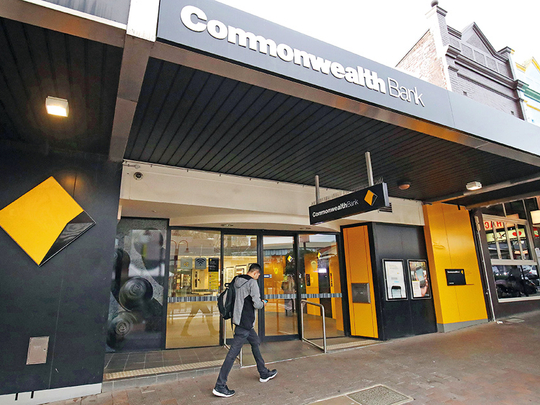
Commentators have for years been exhorting the financial sector to rediscover the pleasures of simplicity.
Instead of getting mixed up in an alphabet soup of acronyms — CDS, CLOs, IPOs, not to mention negative gamma and delta decay — institutions should focus instead on “narrow banking.”
Complexity-fixated rocket scientists caused the financial crisis; by concentrating on the boring business of making loans to households and businesses, banks would better serve their own interests, and society’s — or so the thinking goes.
Commonwealth Bank of Australia looks like a shining testament to this hypothesis. Just 12 per cent of net revenue came from its institutional banking and markets division over the past year, and about two-thirds of the total from plain-vanilla retail and corporate banking.
At the same time, CBA’s price-to-book ratio is the highest at the big end of town globally, after Hong Kong’s Hang Seng Bank Ltd.
After five years of adding to its already-dominant market share, CBA shows few signs of slowing down. In annual results posted Wednesday, loan growth continued to expand at 5.4 per cent a year, while deposits were up 6.6 per cent. The bank’s net interest margin of 2.1 per cent was down on its preferred underlying cash basis, but still well above the global median of 1.7 per cent for big lenders.
The past week’s events, however, suggest a little more awareness of complexity may be overdue.
The money-laundering issue that prompted a lawsuit by Australia’s regulators was caused by a “coding error” and CBA has upgraded its technology and reshuffled or recruited key staff to address the issue, Chairman Catherine Livingstone said in a separate statement Wednesday.
Senior executives will lose short-term bonuses that were worth in most cases between 10 and 20 per cent of their remuneration last year, while non-executive directors will see their fees cut 20 per cent, she outlined on Tuesday:
Collective accountability
In reaching this conclusion, the overriding consideration of the Board was the collective accountability of senior management for the overall reputation of the Group.
The swift response shows how seriously the latest issue is being taken, especially compared to previous scandals around CBA’s financial planning and insurance divisions, and the long-settled case against it by Australia’s securities regulator centring on margin loans to retail customers.
The deeper problem is that these scandals keep happening to CBA.
The constant drumbeat of sharp or negligent practice in pursuit of short-term advantage adds to the impression that the culture within the bank is ignorant of the fact that banking is difficult, and necessarily so.
Asked at a 2015 Bloomberg event how his bank dealt with the danger that financial innovations posed to risk management, then-Chief Financial Officer David Craig essentially brushed off the question.
Money laundering?
Speaking less than two months after CBA discovered that its easy-deposit cash machines had been failing to report transactions, we now know we're being used to launder money for criminal syndicates and terrorist-linked individuals, he said the solution was to make things simpler for customers.
Perhaps that was just a neat line for a public forum, but the lack of paranoia ought to be a warning sign for a business that deals every day with risk.
For the individuals laundering bundles of untraceable bills via CBA’s cash machines, simplicity was a boon.
The bank itself, which faces fines up to a theoretical limit of almost A$1 trillion ($787 billion) as a result, might see fewer benefits.
Narrow banking is all very well, but financial services is a complex business, and getting it right more complex still.
Commonwealth Bank, in its hubris, needs to recognise that.












